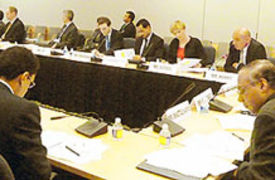
With the purpose of promoting financial inclusion among G24 member countries and other emerging economies through the exchange of knowledge and updates on current progress made on financial inclusion, AFI and the G24 held the Third Annual G24/AFI Roundtable on Financial Inclusion Policy on the 15th of April in Washington.
The opening of the meeting saw Governor of the Central Bank of Kenya and Chair of the AFI steering committee, Professor Njuguna Ndung’u, and >World Bank Managing Director and former Minister of Investment in Egypt, Dr. Mahmoud Mohieldin, take the lead. Governor Ndung’u spoke about the recent growth of financial inclusion and the importance AFI has played in connecting regulating bodies.
Adding to this, Dr. Mohieldin lent support to the idea of using south south exchanges among policymakers to unlock knowledge about how to improve financial literacy and consumer protection. He said that at present a balance between formalizing financial inclusion and regulation needed to be found to prevent regulation from hindering access. AFI’s Executive Director, Dr. Alfred Hannig, also shared a presentation on the progress the organization has made since the last G24/AFI Roundtable a year ago.
As AFI is a key implementing partner of the G20’s initiatives on financial inclusion, a portion of the meeting was devoted to detailing the Global Partnership for Financial Inclusion (GPFI). Susanne Dorasil, Head of the Division of Economic Policy, Financial Sector, German Federal Ministry for Economic Cooperation and Development (BMZ), delivered an overview of the GPFI and its role in supporting Small and Medium Enterprise (SME) financing. Representing the GPFI itself, France, as co-chair, had Cyril Rosseau explain that south-south cooperation is indeed a key element in current development efforts. The value the G20 adds is that it can provide links with financial regulators, Standard Setting Bodies (SSBs), private sector, civil society, and other relevant stakeholders. Moving forward the GPFI will work towards the implementation of its two year program, communicate it to the public, and then report back on its progress at the G20 Cannes Summit in November 2011.
For its part, AFI made a presentation on its role in GPFI sub-groups. This entails work with promoting the application of the G20 Principles for Innovative Financial Inclusion and encouraging SSBs to include financial inclusion in their mandates. In addition to this work, AFI members used their Financial Inclusion Data Working Group (FIDWG) to develop a set of five core indicators to complement the G20 process. Using his experiences as a FIDWG member and AFI Policy Champion, Co-chair of the GPFI Data and Measurement Sub-Group, Raul Hernandez-Coss of Comisión Nacional Bancaria y de Valores (CNBV) of Mexico, delivered a presentation on the goals and work of the Sub-group. This focused on the steps to achieve financial inclusion, the necessity and role of data, and the current plan to define and implement data initiatives.
The G24, represented by Director of the Secretariat, Amar Bhattacharya, emphasized the importance of data as a basis for determining good financial inclusion policy solutions. With regard to GPFI efforts, Mr. Bhattacharya encouraged participants to collaborate in finding effective ways to implement the G20 Principles.
AFI member institutions and other policymakers also took the opportunity to share their insights and experiences:
- The Central Bank of Nigeria is working on solutions to support financial inclusion, one of which is a new and improved version of know your customer (KYC) guidelines. Moreover, agent banking is emerging as a new channel through which to reach the unbanked.
- India’s current model of mobile financial services is bank-led, and due to recent events, consumer protection and balanced regulation are prominent issues. Financial inclusion will also be encouraged through government initiatives.
- The Palestine Monetary Authority, Governor Jihad Al-Wazir, has seen many improvements in the financial inclusion sphere. Since a credit bureau was established in 2008, credit has gone up an average of 30% and the active credit scoring system has reduced risks. Microfinance has created jobs for women and financial awareness/literacy programs have reduced the number of bad market practices. In terms of mobile banking, 17 banks are collaborating on launching a single platform.
- The Reserve Bank of Malawi, Governor Perks Ligoya, suggested that financial inclusion initiatives should look into the financial sector as a whole. As a new AFI member, the bank is encouraged to see the intensive effort put into financial inclusion and mentioned that developing countries such as Malawi need complimentary support from many actors and stakeholders.
- The Bank Al-Maghrib of Morocco highlighted the importance of financial literacy and how it might hold the key to greater financial inclusion. The bank held that a national financial inclusion strategy is the principal starting point, and a fundamental part of this strategy should be an intensive financial literacy program.
The AFI network appreciates its fruitful collaboration with international bodies such as the G24 and G20 to promote financial inclusion and the specific challenges facing developing nations on this issue.

 About
About
 Online
Online
 Data
Data





















